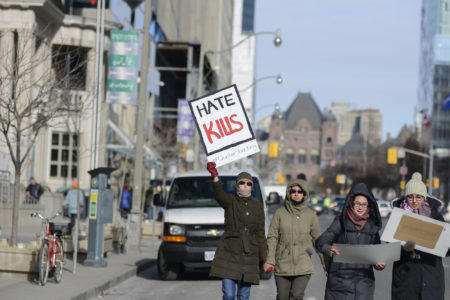
Frustrated Canadians are grasping for a good explanation about how their country became the site of two Islamophobic mass killings within a five-year span.
After all, it’s the bigger neighbour down south that elected an unstable president with despotic tendencies who trashed Muslims and Mexicans on his way to the top. Canada was supposed to be the respectable contrast, hailed by The Economist after Trump’s 2016 victory as “the last liberals”– guardians of centrist values, sane democracy, and respect for evidence and science.
That narrative of an imported hatred persists even after four members of a Muslim family were killed walking the streets of suburban London, Ont. Be it neo-Nazi gangs, anti-Semitic forums, or Islamophobic killers, none of it seems to fit the docile portrait of “mainstream Canada” with its internationally renowned multicultural mosaic. One or two deviants must have read too many 4chan posts. They can’t possibly define the respectable Canadian institutions that remain a bulwark against nativist populist waves.
This high-minded self-satisfaction makes it easier for people to deal with tragedy, but it’s easily disrupted by facts that make parts of the Canadian mainstream look as bad as the “few bad apples” who usually get the blame. Because for at least the past five to six years, a significant swath of Canadian politicians has attempted to extend and galvanize their base by courting the same rotten apples they verbally denounce from time to time.
The handiest tactic for this often-delicate strategy isn’t substantive evidence-based argument, but rather dog-whistle identity politics that triggers a now-growing far-right rage culture.
One can point to the emergence of Maxime Bernier’s People’s Party of Canada and other xenophobic figures’ quixotic entry into electoral politics as unashamedly extreme versions of this, but it was Andrew Scheer’s Conservative Party that defined this trend in the years between the Quebec City massacre and the London truck attack.
The result wasn’t major electoral success like they’d hoped, but it fueled a political climate that became more accustomed to legitimizing social issues in terms of growing nativism. Scheer and his party didn’t get in front of cameras to do their best Trump impersonation (though some have tried). Rather, they took festering rumours and narratives peddled along Canada’s margins, gave them a good rinse, and brought them into Parliament and on mainstream TV news to be taken seriously. The examples bear reviewing after this month’s mass killing in London.
Tory criticisms against Prime Minister Justin Trudeau signing the 2018 UN Global Compact for Safe, Orderly and Regular Migration rested on the ostensibly legitimate need to protect national sovereignty. They were also a deodorized version of the far-right’s obsession with the UN agreement as a grand conspiracy to degrade national sovereignty.
Scheer speaking at the 2019 “United We Roll” rally in Ottawa (formerly named the “Yellow Vest Convoy”) was apparently a legitimate showing of solidarity with embattled oil and gas industry workers who wanted the feds to hear from the neglected Prairies. Except a convoy protest featuring a publicity-hungry white nationalist and organized by supporters of far-right extremists like the “three percenters” had as much to say about “UN-Globalists,” “dirty foreign oil” and “open borders” as they did about oil and gas.
As leaders across parties gave their thoughts recently on the London killings and pledged to eliminate elements of hate in Canadian society, Erin O’Toole, who has replaced Scheer as Conservative leader, explicitly named Islamophobia as the type of hatred that needs special attention. He even challenged Trudeau (along with a number of civil society groups) to follow up on Muslim organizations’ call for an “emergency national action summit on Islamophobia” by July.
This marks a huge 180 for the party. It’s not O’Toole’s eagerness to stand with the Muslims that surprises, but rather his usage (and by extension his party’s tacit endorsement) of the dreaded “I-word” – a term that his predecessor expressly rejected.
Specifically, Scheer, who was a leading candidate for party leadership at the time, was uncomfortable with the term being used in the 2017 Liberal motion to “condemn Islamophobia and all forms of systemic racism and religious discrimination” because, as far as he was concerned, it amounted to a curbing of free speech by stigmatizing legitimate criticisms of Islam and giving the religion special treatment.
The largely symbolic motion – debated right after the Quebec City shooting in January 2017 – also called for a study to be undertaken on how systemic discrimination and Islamophobia could be stemmed, but it wasn’t a bill or a law so it had no binding power. Yet such an innocuous, symbolic gesture soon triggered a prolonged and divisive discussion over whether the Liberals were trying to use the term Islamophobia in a motion (introduced by Muslim MP Iqra Khalid) to help outlaw criticisms of Islam and destroy free expression.
Motion-103 easily passed, but without the blessing of most Conservatives, many of whom echoed Scheer and Alberta MP Garnett Genuis’s reasoning: that “Islamophobia” as a term “can be used to mean both discrimination against Muslims and criticism of Islamic doctrine or practice. It is important that we not conflate the two.”
And like that, a popular conspiracy theory among far-right anti-Muslim activists – that Motion-103 was an Islamist attempt to stem free speech and criticism of Islam while beginning our transition into a “Shariah-compliant” Canada – found a version of itself being taken seriously in the halls of power.
It was a masterclass in collective gaslighting: simply speak as if a symbolic motion held special powers to damage Canadians’ God-given right to criticize any religion they want, especially one that involves scary things like “Shariah law.” The ensuing argument at the highest level of government thus automatically legitimized a clearly vacuous line of reasoning.
Fringe groups like Canadian Citizens for Charter Rights and Freedoms (C3RF) soon held events on Motion-103 to warn how terms like “Islamophobia” were really “part of a well-funded public relations campaign” to facilitate the “replacement of Canadian Law with sharia law.” The group accused Khalid – given her “unsavoury Muslim Brotherhood-linked connections” – of being an agent of this hidden conspiracy and her party bosses of being willing to play along for the brownie points, while corrupting Canadian values.
Monthly rallies attended by far-right, anti-Muslim groups like the Soldiers of Odin as well as other groups such as the Jewish Defense League were also held near Toronto’s city hall, decrying Motion-103 and its conspiratorial attacks on Canadian freedoms on behalf of shadowy Islamist puppet-masters. Antifascist counter-protestors and journalists who showed up were often mocked, baited or beaten up.
On the surface, it was hard to imagine a thread linking these seemingly fringe clashes and groups with the Scheer Conservatives’ official position on Motion-103, but they all pushed the same contrived narrative about the “I-word’s” (and Motion-103’s) likely existential threat to Canadian values. The Conservatives were adamant enough to request a recorded vote on the motion, which required the names of those voting for and against to be officially registered, as opposed to the usual voice vote.
They couldn’t have foreseen it, but such a recording made it much easier to see which Conservatives condemning Islamophobia after the London attack also voted against the very motion a few years ago that condemned Islamophobia.
They include O’Toole, but also the Conservative MP for Elgin-Middlesex-London, Karen Vecchio, who stated after the attack, that “these murders were fueled by Islamophobic bigotry (which) makes it even truly unfathomable.… Londoners and all Canadians stand against racism, Islamophobia and any other form of bigotry or hatred.”
On June 11, just days after the London attack, Parliament also unanimously voted a motion to convene an “emergency national action summit on Islamophobia” that many civil society groups had been seeking. That means every Conservative MP also voted in favour of it, including former CPC leader and current Regina–Qu’Appelle MP Scheer himself. It’s amazing what a difference a few years make. No one is complaining about the word Islamophobia this time around.
These chastened converts are proof that the 2017 debate rested on little more than a momentarily expedient canard. When it comes down to it, no one is really all that confused about the definition of Islamophobia. No one utters it with fearful trepidation of Islamist hordes raiding Ottawa.
It took a particularly stark cynicism to politicize simple denunciations of hate just to get more votes. That cynicism fed into a dangerous echo chamber of far-right extremism, which now ranks as one of Canada’s top security threats. You just can’t blame it all on the Americans.







